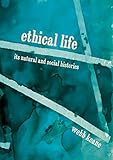Ethical Life : Its Natural and Social Histories / Webb Keane.
Material type: TextPublisher: Princeton, NJ : Princeton University Press, [2015]Copyright date: ©2015Edition: Pilot project. eBook available to selected US libraries onlyDescription: 1 online resource (304 p.)Content type:
TextPublisher: Princeton, NJ : Princeton University Press, [2015]Copyright date: ©2015Edition: Pilot project. eBook available to selected US libraries onlyDescription: 1 online resource (304 p.)Content type: - 9780691167732
- 9781400873593
- Ethics, Evolutionary
- Ethics
- Ethics; Anthropological aspects
- Ethics; Social aspects
- SOCIAL SCIENCE / Anthropology / General
- American feminism
- American feminist movement
- British abolitionism
- Buddhist monk
- Cairene Muslims
- God's-eye view
- Universal Declaration of Human Rights
- Urapmin Charismatics
- Vietnamese communism
- atheism
- communist revolutions
- consciousness-raising
- conversational interaction
- dewa
- discrimination
- egalitarian values
- ethical accounts
- ethical actions
- ethical affordance
- ethical affordances
- ethical agency
- ethical beings
- ethical evaluations
- ethical history
- ethical implications
- ethical life
- ethical questions
- ethical reflections
- ethical universality
- ethical values
- ethics
- feminist consciousness-raising
- general principles
- human biology
- human capacities
- human rights movement
- humanitarian movements
- humanitarianism
- intention-seeking
- intentionality
- mind
- momentary decisions
- moral consistency
- moral psychology
- moral revolutions
- moral sensibility
- morality
- morals
- norm-seeking
- objective social analysis
- piety movements
- political revolutions
- psychological research
- psychology
- recognition
- reflexive awareness
- role-swapping
- social dynamics
- social history
- social interaction
- social interactions
- subjective experience
- virtues
- 170 23
- BJ52
- online - DeGruyter
- Issued also in print.
| Item type | Current library | Call number | URL | Status | Notes | Barcode | |
|---|---|---|---|---|---|---|---|
 eBook
eBook
|
Biblioteca "Angelicum" Pont. Univ. S.Tommaso d'Aquino Nuvola online | online - DeGruyter (Browse shelf(Opens below)) | Online access | Not for loan (Accesso limitato) | Accesso per gli utenti autorizzati / Access for authorized users | (dgr)9781400873593 |
Frontmatter -- Contents -- Acknowledgments -- PART ONE. Natures -- Introduction. Ethical Affordances, Awareness, and Actions -- Chapter 1. Psychologies of Ethics -- PART TWO. Interactions -- Chapter 2. Selves and Others -- Chapter 3. Problematizing Interaction -- Chapter 4. Ethical Types -- PART THREE. Histories -- Chapter 5. Awareness and Change -- Chapter 6. Making Morality in Religion -- Chapter 7. Making Morality in Political Revolution -- Conclusion -- Bibliography -- Index
restricted access online access with authorization star
http://purl.org/coar/access_right/c_16ec
The human propensity to take an ethical stance toward oneself and others is found in every known society, yet we also know that values taken for granted in one society can contradict those in another. Does ethical life arise from human nature itself? Is it a universal human trait? Or is it a product of one's cultural and historical context? Webb Keane offers a new approach to the empirical study of ethical life that reconciles these questions, showing how ethics arise at the intersection of human biology and social dynamics.Drawing on the latest findings in psychology, conversational interaction, ethnography, and history, Ethical Life takes readers from inner city America to Samoa and the Inuit Arctic to reveal how we are creatures of our biology as well as our history-and how our ethical lives are contingent on both. Keane looks at Melanesian theories of mind and the training of Buddhist monks, and discusses important social causes such as the British abolitionist movement and American feminism. He explores how styles of child rearing, notions of the person, and moral codes in different communities elaborate on certain basic human tendencies while suppressing or ignoring others.Certain to provoke debate, Ethical Life presents an entirely new way of thinking about ethics, morals, and the factors that shape them.
Issued also in print.
Mode of access: Internet via World Wide Web.
In English.
Description based on online resource; title from PDF title page (publisher's Web site, viewed 30. Aug 2021)


